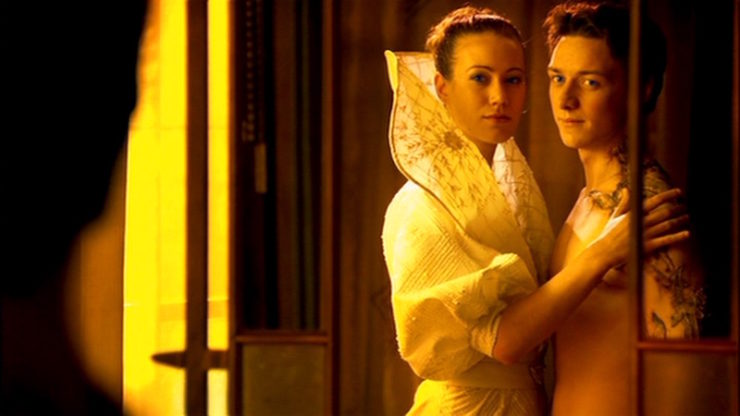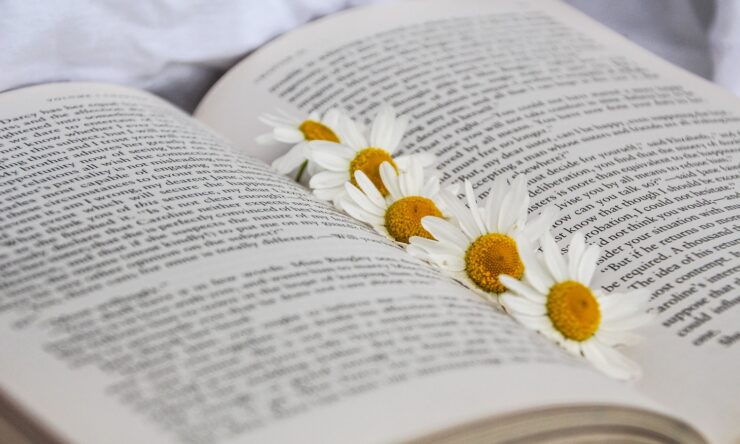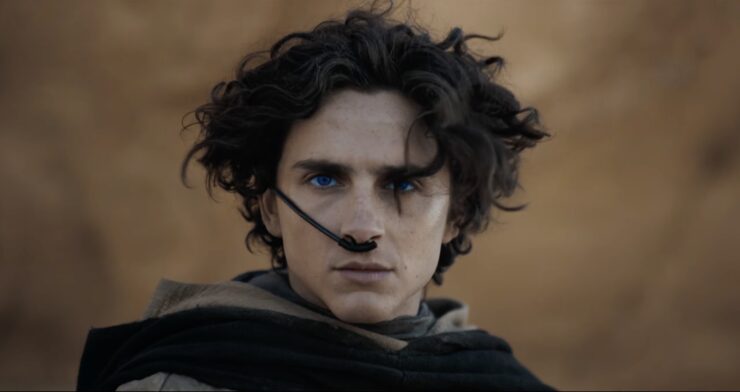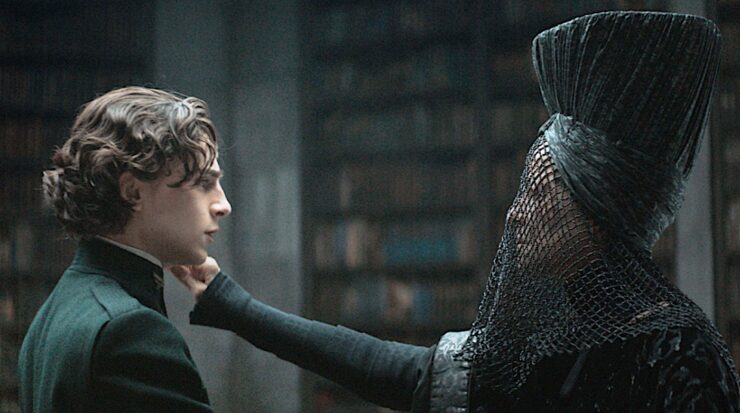Three years after the release of Sci-Fi’s Dune miniseries, its sequel premiered. While it was titled Children of Dune, it in fact encompassed the storylines of both its namesake and Dune Messiah. It remains, along with its predecessor, two of the three highest-rated programs that the channel has ever broadcast—and there are ways in which this sequel series outstrips the initial series entirely.
Children of Dune is separated into three film-length episodes, with the plot of Dune Messiah taking up the bulk of the first. There are a few clever changes made in order to connect the two stories better, the primary one being that rather than having Princess Irulan work as a conspirator against Paul alongside the Bene Gesserit, the Spacing Guild, and the Tleilaxu, her sister Wensicia is brought to the fore sooner and given that role. This has two advantages; it means that Irulan’s love for Paul doesn’t come out of left field the way it does at the end of Dune Messiah, and it means that the story spends more time with Wensicia… who is played with antagonistic relish by Susan Sarandon.
(In case anyone is unaware, the rules are that if you have the ability to use Susan Sarandon, you always must use Susan Sarandon. You must slip her into ever scene and transition, you must linger on her imperious eyebrows, you must dress her like a glittering carnivorous plant. Obviously.)
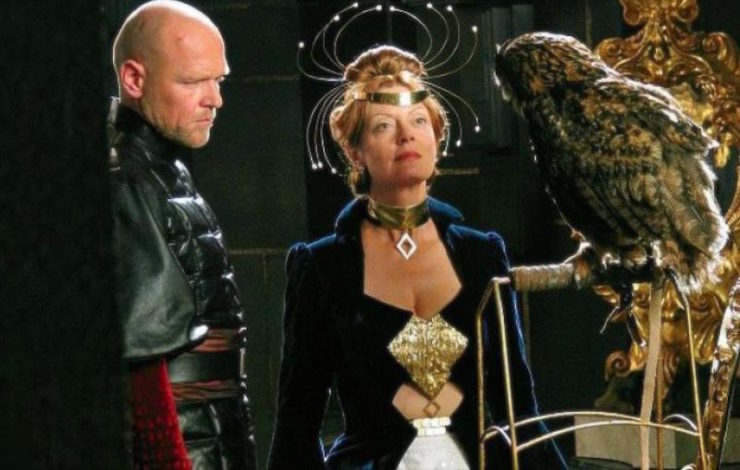
On the other hand, the series cannot cover up how thin on the ground the plot of Dune Messiah truly is. Even ninety minutes is too long a time to stretch the story, and there are a few lengthy awkward montages in the first episode to make up for a lack of machinations and intrigue. Because Messiah is so caught up in philosophical meanderings about the nature of time and religion and leadership, there’s no real way to translate its majority to film, and instead we wind up with strange visions from Paul’s (shirtless) future son and constant lingering shots of a swirly carved wall. It is clearly supposed to seem mystical, but when it happens too often the whole thing tips into a repetitive fever dream.
There is a lot of recasting that had to happen for Children of Dune, and those decisions ran from genius to the downright baffling. Saskia Reeves was unable to return as Jessica due to pregnancy, which resulted in the producers getting the person who they had originally wanted to play the role—Alice Krige. While it’s hard not to miss Reeves’s elegance, there is an otherworldliness to Krige that suits a Bene Gesserit “witch” superbly. Duncan Idaho is recast in the form of Edward Atterton, and while his turn as Atherton Wing on Firefly was odious, he plays the mentat ghola reincarnation of Idaho with all the upright stoicism and vulnerability that the character is owed. Karel Dobry, who played Kynes in Dune is recast here as the betraying priest Korba… which seems an apt metaphor in the transition, yet never succeeds in being anything less than confusing. But the most awkward of all these moves was the recasting of Stilgar; Steven Berkoff is an incredible character actor, but there is nothing about him that even remotely invokes the old Fremen Naib. Instead, he reads at the beginning like the Atreides family butler before moving onto Old British Wardog Supreme.
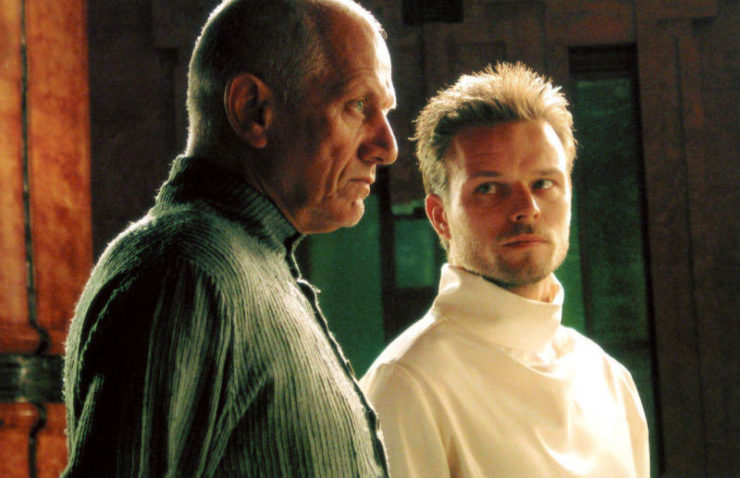
Once Dune Messiah has run its course, we get into the meat of the story with Children of Dune’s plot, and we get to meet Paul’s children—who were, similar to Paul in the previous miniseries, aged up for this telling. It is a smart move here, as finding two ten year old kids who had the ability to behave as though they had millennia of ancestral memory bubbling up inside of them was always going to be an impossibility. Instead, we have two teenagers who are inordinately close… the series doesn’t really have the time to delve into the weirdness of Leto and Ghanima’s role-play as their parents via their memories, so we’re treated to your average twin-strangeness (which is an official genre fiction term, as far as I’m concerned) and vague incest-ish vibes. Not Cersei and Jaime incest vibes, though. A decidedly more healthy, non-abusive incest vibe that mostly involves the two finishing each other’s sentences, the occassional kiss, always turning their heads at the same moment, and playing space chess while giggling.
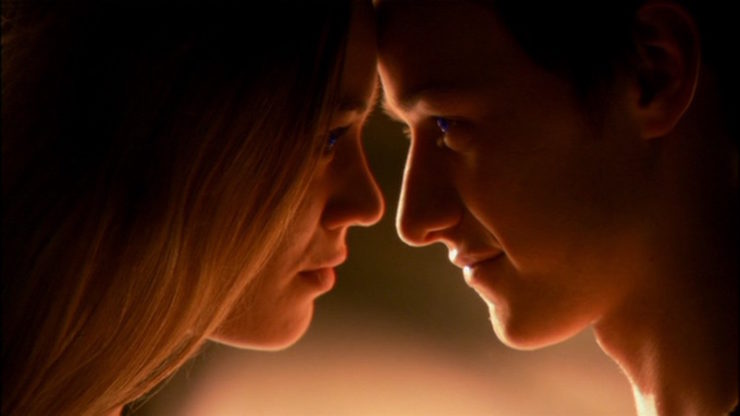
Oh, and did I mention that Leto is played by none other than baby-faced James McAvoy? That is, baby-faced, constantly shirtless, ponderously pouting, unaccountably ripped James McAvoy. Which should not be read as a disparaging remark, by the way—he’s easily one of the highlights of the miniseries, and he plays the part with a sort of brooding-yet-impish etherealness. He’s really excellent, and his rapport with Jessica Brook’s Ghanima is dazzling. McAvoy had done a couple of things on screen (including the Band of Brothers miniseries) before this, but Children of Dune was the first time I ever saw him, and I remember thinking in my teenaged precociousness, This guy is clearly going somewhere. Two years later he was Mr. Tumnus in The Lion, the Witch, and the Wardrobe, which cemented his SFF cred long before Professor Charles Xavier was ever on the table.
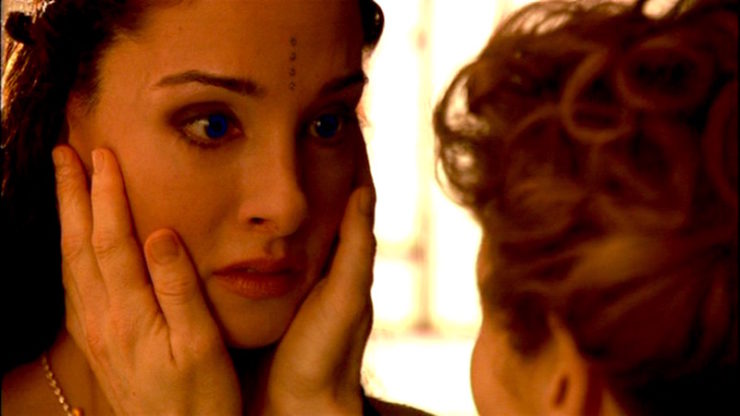
The other highlight of the series is Daniela Amavia’s turn as Alia Atreides. Because a television series is ill-suited to the philosophical questions that the Dune books are constantly posing, there is more of a chance to really explore the characters in a way that Frank Herbert himself often neglected. Alia suffered quite a bit in this regard, which makes it all the more satisfying to see her struggle played out to the fullest. When Jessica arrives back on Arrakis and they embrace, we can see Alia briefly overcome with warmth at her mother’s presence before shutting down when she sees that Jessica is focused on her grandchildren. Her slow cave to the Baron Harkkonnen’s possession, her descent into paranoia and fury, her grief at the Preacher’s murder, all of this receives the attention it warrants. One of the most cinematic scenes from the book—where Jessica finally comes to blows with Alia in the court and is whisked away by loyal Fedaykin—is preserved with aplomb.
And rather than have Alia throw herself out a window to end her possession once and for all, the miniseries does something devastating—Alia stabs herself, and as she lies on the floor dying, Jessica takes her into her arms. In a moment of exact parallel between her child self in the Dune miniseries, Alia reaches up to touch her mother’s tears, tastes them, then whispers, “I want my brother,” before joining him in death. It is one of those rare moments that makes the book seem clumsy and frail by comparison.
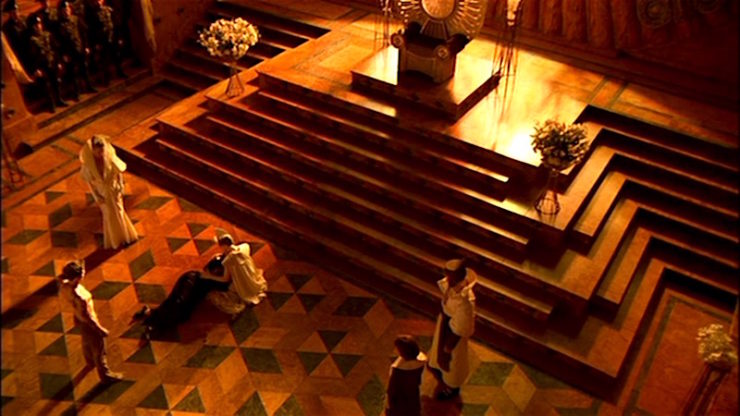
In a departure from the original story, Wensicia’s part in the tale doesn’t come to an end until Farad’n has been delivered to Ghanima, which is a smart play to keep Susan Sarandon around as long as possible (see the aforementioned rules), and also heightens the drama as the series barrels toward its conclusion. More thought is put into Wensicia’s scheming, and more thought as well into Irulan’s plight as a discarded member of the same family. While it is depressing to see Irulan resigned to spending her life looking after other people’s children, giving her a complete character arc and keeping her at the center of things is far better than what she receives in the books.
There are other moments of perfect execution, proving that the makers of this miniseries still cared deeply for the story they were telling and the universe it occupies. The dual conversations between Irulan and Reverend Mother Gaius Helen Mohaim—and later Jessica—are gorgeous, offering subtitles to their sign language while an entirely different conversation plays out in words. The iciness of Wensicia Corrino as she belittles her son Farad’n over and over, only to be outsmarted in the end. Gurney’s sorrow on meeting the Preacher and realizing that he must be Paul, and the Preacher’s assurance that Paul Atreides is no more to spare his old friend the grief. Leto tearfully confessing to the Preacher that he wished for a childhood spent with the father he never knew. Children of Dune paints the pain of these mythical figures in grounded tones, giving it that Shakespearean quality that so many epics scrabble toward and fail to find.
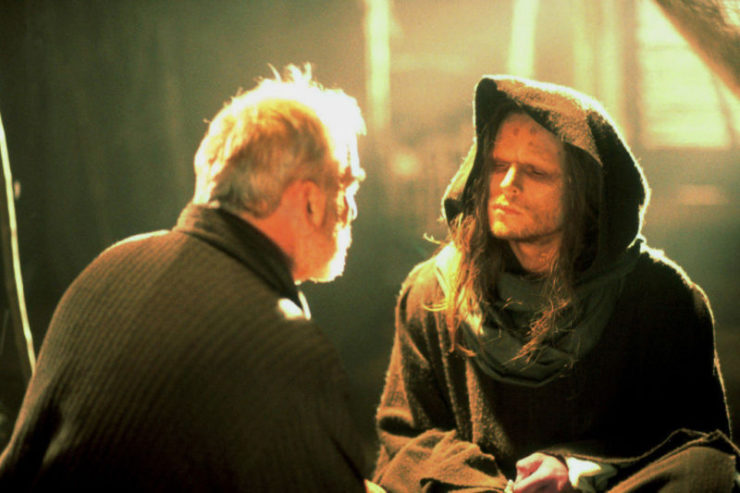
There are little quality control issues that niggle, though. For example, the Fremen blue eyes that many characters should have simply disappear, with Jessica being the most conspicuous in that absence. The stillsuits don’t make sense in this version; in the books, there are cheaply made new stillsuits coming to market, but that doesn’t explain why all the characters would have them. No one seems to age, which could be viewed as either a bug or a feature—fans know that the spice can keep people younger, and that Alia deliberately manipulates her body to prolong her life, and the result is a wide array of ages for cast members in ways that can run delightfully backwards. The CGI is poorer this time around, and the sound stage sets are more obvious than they were in the original miniseries. Whether this was a budget issue, or a problem of needing more desert sets, parts of the series are rendered in a manner that almost seems unfinished.
This was not true of the costume department, however, as the success of the previous series only seemed to prompt the question ‘hey, can we do even more and better this time?’ The result is a gorgeous array in a variety of textures, styles, and colors. But perhaps my favorite part of this is that practically all of the costumes for the ladies look like they have elaborate skirts on the surface, but are always hiding pants beneath. All of these powerful women get dress silhouettes, but still have the benefit of leg wear. They are some of my favorite costumes in SFF history. Functional, outrageous, and stunning.
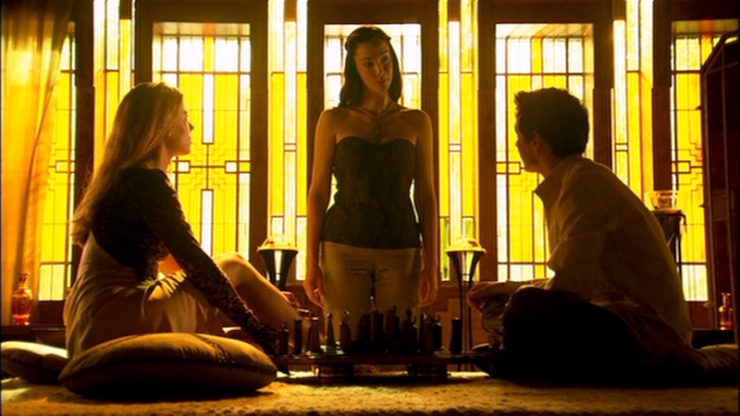
The actual themes of Children of Dune are a bit lost in this version, however. Leto claims that he wants to bring about the Golden Path in order to give humanity a future free of premonition, where people can decide their own destinies, which is only… half true. Leto certainly means to prevent the terror of predetermination, but mostly by giving himself the means to hold a status quo for several millennia in the form of a worm-god. The changes in the miniseries make Leto’s end a bit more palatable, but also harder to understand. It’s never precisely clear what he is working toward, other than making sure that his aunt is no longer regent. The ending is bittersweet, which is not truly the case in Hebert’s books, where the long view of history makes it impossible to celebrate overmuch.
All in all, the Children of Dune miniseries is a treat to watch. Which is saying something considering that the books it heralds from would have been considered unadaptable to many. The fact that the story has been rendered so carefully is a surprise to this day—the fact that it is still worth watching even moreso.
Emmet Asher-Perrin has a ridiculous soft spot for this series, and will often comfort watch it ahead of Dune. You can bug her on Twitter and Tumblr, and read more of her work here and elsewhere.










